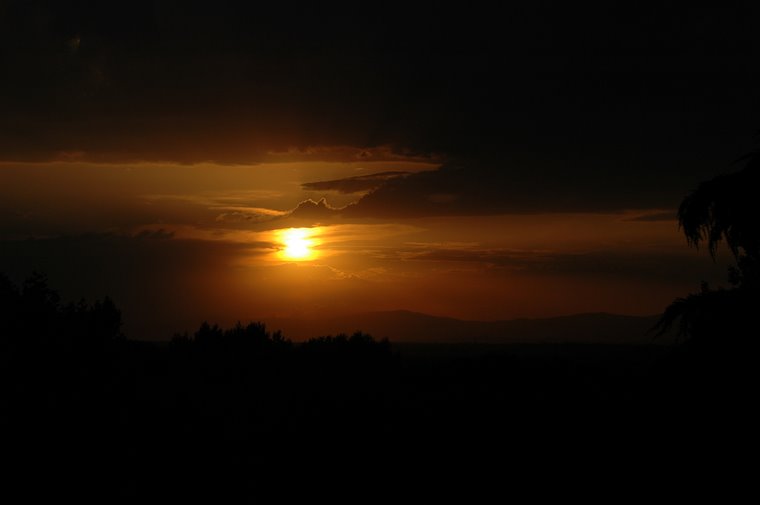I cradled the football in my left arm and sprinted down the lit field. Cars provided sidelines; headlights cast jagged, horizontal shadows across the players, across the soccer-turned-football field. Our annual co-ed football game; the Night Game. My friend Peter, the farmer’s son, caught up to me. He always tackled like a girl—never with his shoulders, but with slapping, flailing hands. His left arm swept around me like a frightened cat. He clung for a moment, allowing his right hand to swing in—a stupid, frantic tree branch. He caught the bridge of my nose, the septum, and blood rushed to meet him.
My friends kept playing; I blazed a trail of blood—a rich red—off the field, on my dad’s car door, and then out to the lit barn. Peter came with me, and we assessed the damage. There was no pain, or very little at least—more like the dull soreness of being hit in the head, and less like the sting of like splitting skin. Peter advised pinching the nose; I refrained though—I’d heard reports of drownings.
I hung my nose over a trash can, trying to stop it, trying to drain it. Soaking tissues and napkins began to accumulate, the faucet stayed on. Peter and I made small talk—the barn was new, and nice; the sweet new four-wheeler; the impending second year of high school. He grabbed a few Cokes from the barn’s stocked fridge. Drinking and bleeding proved difficult. Outside, the game continued. Inside, my nose clogged and shut.
The doctors didn’t tell me anything because I stopped the bleeding and decided not to go see them. It bled one more time, thick mucous blood that seemed like it came straight from my brain. After that, I was fine.
---Ž---
The philosophy department at our school is a one man band; Steve Horst; The Big Show. There are thirty of us, his young and eager and budding philosophers. We own our philosophy—and take our futures lightly. We are not well respected. We do not get into big programs. Our future is a tooth tied to a doorknob and we love it. Some left our group, and we hated them, dismissed them, and gathered back to ourselves, muttering about turning back, about not having it. I love philosophy. Philosophy answers questions. Or at least, it asks sharper, pointier ones that prick and poke until you have to wrap them into different questions. We love our philosophy major because we find out what and who is wrong, and because we become sensitive, finally and above all, to truth.
We went to
---Ž---
Five years after the night football game, my nose still cracks like a knuckle. The sound is a mix between a light switch and the click of joints popping. Most people don’t believe me. My uncle does a very convincing nose-pop rendition with his thumb and teeth. Mine is real; it really pops, cracks, or snaps—whichever sound I think is most appropriate to a particular setting. Most people cannot deal with my nose. I asked my Aunt Elaine, an RN of twenty-five years, for advice. She shrieked “Eww! Eww! Eww!” as she ran out of her kitchen. Anyone who knows me well has heard my nose—and most hate it. I find myself playing with it a lot. Not on purpose, but often. The bridge of my nose can be maneuvered to the right or left; I do this to take a deep breath, or smell.
---Ž---
The
---Ž---
Noses, especially human ones, are not imaginative. The senses are not good with “what could be.” They only do “what is.” Imagine a person whose sight is slightly underdeveloped at birth, so that green is never more than dull gray. Their brain will never understand rich Amazonian hues, no matter how long they try. It’s something about categories and possibilities; everything our senses detect must fit into a drawer in our mind. Our minds sort out our senses efficiently, but if there is no drawer for a sensation, the mind discards it.
I’ve learned that drawers can be locked, too—and if enough time passes, drawers can be forgotten altogether. My nose forgot what it was like to breathe. A few months ago, I was fidgeting with it, probably in a class, maybe in church—I pressed firmly on the malleable cartilage, squishing it down and slightly left. I took a breath—mouth closed—and air spilled through my nostrils like an open dam. Exhilaration. I did it again. It worked again. Inhale. Exhale. So that’s how it is supposed to work—and a drawer swung open.
---Ž---
The people who gathered at the
I think that truth has a stink to it. It’s slight, but it’s there. Truth is kind of the ultimate drawer—everyone has some sense of what it smells like. I don’t know how so many conflicting reports about truth emerge, why people can look at the same information and come up with such different answers, or why there are always traces of the smells that never seem to lead us to the things in themselves. Some get closer than others, but we never quite get there.
Those brilliant, crazy people at the


